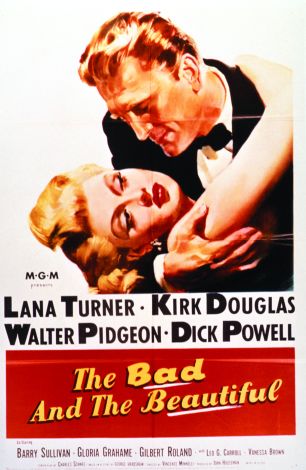
Vincente Minelli's self-reflexive, highly stylized profile of a charmingly manipulative producer (Kirk Douglas) seeking a comeback is one of the most cynical and enjoyably trashy films that Hollywood has ever made about itself. Appearing during the height of noir, when the movie business was taking a more jaundiced view of itself in films like Sunset Boulevard (1950) and The Big Knife (1955), the film employs many of the stylistic and narrative techniques of Citizen Kane (1941) in portraying a similarly ruthless figure, yet turns Welles' theme inside out, presenting its back-stabbing protagonist as a charming rogue. Originally based on George Shaw's story, Tribute to a Bad Man, a thinly veiled take on Broadway producer Jed Harris, a tyrant whose evil nature was so familiar to theater folk that Laurence Olivier based his characterization of Richard III on him, it eventually mutated into a film a clef on well-known Hollywood players, with David O. Selznick the likely model for Douglas' Jonathan Shields. Its three acts are structured as a triptych of flashbacks in which Douglas attempts to seduce each of the three talents he discovered -- director Barry Sullivan, actress Lana Turner, and writer Dick Powell-- into returning to help him jump-start his moribund career, despite the way he's damaged their lives. As their stories unfold they reveal the energy, charm, panache, and high spirits of their former boss along with his shameless conniving, outright theft, and part-time pimping. But the perspective of the film, which he dominates completely, is that of an ex-Nazi who says, "Sure the Fuhrer was a bastard, but damn, he made things happen." Douglas has rarely been better, seizing every moment onscreen as if it were his last, and Gloria Grahame is excellent as the highly distracted writer's wife. Composer David Raksin's lush, harmonically inventive score is also among his most evocative, but the star of the film is Vincente Minelli.
